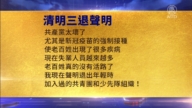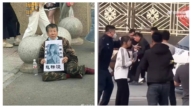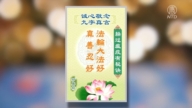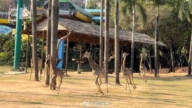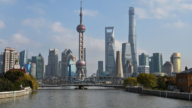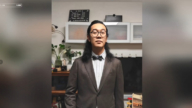【新唐人2014年01月24日訊】自中共49年竊權建政以來,特別是從1978年底進行的改革開放,至今經歷了35年的所謂「中國經濟崛起」,可是「地方債」、「錢荒」、「鬼城」、「通貨膨脹」等中國特色問題紛紛爆發,讓人驚覺中國經濟背後的貓膩。那麼中國的金錢和財富哪去了?日前,台灣「博大出版社」出版的《赤龍的錢囊——謝田看中國經濟》一書,披露了這一中國經濟的真相。
自去年6月開始,中國的「錢荒」就像霧霾一樣,籠罩著中國的經濟,揮之不去。21號,大陸央行注入資金3700多億元人民幣,再度引起了國際輿論對中國「錢荒」的高度關注。
旅美學者謝田認為,中國經濟目前面臨三大問題:地方債務、房地產泡沫以及通貨膨脹。
1962年出生於赤色中國,喝著中國共產黨奶水長大的謝田,曾衷心希望成為一名共產黨員,直到來到西方社會,獲美國「喬治亞州立大學羅賓遜商學院」工商管理碩士及市場博士,在美國待了20年,謝田漸漸從那深信不疑的「馬列思想」枷鎖中解開。
謝田目前研究的領域,包括中國經濟和商業、市場戰略、商對商營銷、國際營銷等。他對中國經濟常有獨特的見解,他表示,「我從中國大陸出來,中共公布的任何數字大家都不要相信,都是假的。你相信中國的任何數字,你一定會栽跟頭。」
謝田:「實際上在過去十年中,(我)寫了很多關於中國經濟的評論文章,台灣出版界的朋友來信說,願不願意把這些文章集結成書,來做一個系統性的闡述,對中國經濟的看法。這個經濟不光與一般的經濟不一樣,(中國)經濟的真相很多會被掩蓋。」
去年11月《赤龍的錢囊——謝田看中國經濟》(The Dragon’s Vault – Chinese Economy behind the Curtain),由台灣「博大出版社」出版、全球發行。
為書作序的台灣「中華經濟研究院」研究員吳惠林教授表示,由出身紅色中國的謝田,在跳脫共產社會進入自由民主的美國之後,對兩種體制生活的實際體驗和比較中,來診斷中國的經濟,的確有說服力。
台灣中華經濟研究院研究員吳惠林:「中國的經濟在外人來看,像霧裡看花,比較難看到中國裡面比較實質的東西。他是中國人,他在中國生活很長時間,親身經歷過,現在到國外來,重新在國外的環境感受,再來比較中國的情況,單就比外國人、台灣的,或香港的看中國經濟,應該是比較深入。 」
謝田表示,《赤龍的錢囊》披露了中國60多年的經濟問題,從計劃經濟、到後來的改革開放,以至現在的經濟出現地方債問題,甚至房地產、股市泡沫等通貨膨脹問題。而在其中扮演主要角色的,就是中共這個獨裁統治集團。謝田說,中共的權貴綁架了中國經濟。
謝田:「從開始無產階級革命、土地改革、工商業改造,用暴力把最初的財富掠奪過去﹔從60、70年代以後,進入90年代,掠奪方式有了變化,加了很多新的內容、新的技巧,很多資本主義的因素,而這些方式也變得具有欺騙性。一方面,公然赤裸裸的掠奪,另外就是把權力直接轉化成資本,很多掠奪用欺騙的方式下進行,實際上它的錢囊是這樣逐漸的飽滿起來。」
台灣「關懷中國人權聯盟」理事長,前總統府人權委員會委員楊憲宏,在他的廣播訪談節目裡,談到了自己讀完《赤龍的錢囊》的感受,他表示,「這是一本很好的書。」而他在台灣書店翻看其他有關中國經濟的書中,卻「看到很多騙人的東西」。
相較於一些大陸出身的經濟學者,他們即使來到西方或國際社會,仍無法看清中國經濟亂象的根源。吳惠林表示,「中國的經濟學教育是馬列主義經濟學,不是真正的經濟學,而是政治經濟學,是用馬克思主義經濟鬥爭的理論來指導、看待,是對經濟學徹底的扭曲。」
採訪編輯/易如 後製/李勇
The Money Bag of the Red Dragon
Since the Chinese Communist Party (CCP)
took power in 1949, and especially
since implementing the policy of opening and reform
at the end of 1978, China has experienced 35 years of
so called “China Economy Rise".
However, many of China’s characteristic major issues
including “Local Government Debt", “Coin Famine",
“Ghost City", “Inflation" and so on burst out one by one,
which alert the world to something fishy
inside China’s economic boom.
In view of these major issues,
where are China’s money and assets? Recently,
Taiwan Broad Press published a book
The Dragon’s Vault – Chinese Economy behind the Curtain,
which revealed the truth about China’s economy.
Since June last year, China’s “Coin Famine" is like a haze
which doesn’t go away,enveloping China’s economy.
Jan 21, China Central Bank released 370 billion RMB,
which triggered world media to be
highly concerned that China’s “Coin Famine"
was back once again.
American Chinese scholar Dr Xie Tian says:
“China’s economy is facing three major problems:
local government debt, a property bubble and inflation."
Dr Xie was born in Red China in 1962 and he grew up
in an environment brainwashed by the CCP,
which made him once a sincere CCP member.
Xie Tian gradually unlocked himself from the shackles
of “Marxism-Leninism" which he undoubtedly believed,
after he had been in the USA for twenty years
and after he obtained the MBA of US Robinson College Business
of Georgia State University and a PhD degree in marketing.
Dr Xie’s current research fields include
China’s economy and commerce, market strategies,
business to business marketing, international marketing etc.
He has many unique insights into China’s economy.
He says “I came from Mainland China.
Please don’t trust any figures published by the CCP.
All of them are false. If you trust any of China’s economic data,
you will surely lose money."
Xie Tian: “Actually during the past decade, (I) wrote
many economic review articles about China’s economy.
A friend who works in the Taiwan publishing field asked me
if I could compile all of these articles
and rewrite them into a book to systematically articulate
my views about China’s economy.
China’s economy is not only different from other countries’,
but also the truth of it has been hidden."
In November last year, a book The Dragon’s Vault –
Chinese Economy behind the Curtain was published
and sold across the world by Taiwan Broad Press.
Taiwan’s China Economy Academy Research Professor
Wu Huilin wrote the preface for the book.
He says, Xie Tian was born in Red China
but later left communism and
entered America with freedom and democracy.
He has personal practical experience
and contrasts two different regimes.
In view of such a background, diagnosis about China’s economy
made by Xie Tian is convincing.
Wu Huilin: “for outsiders,understanding China’s economy
is similar to seeing flowers in fog, and it is hard
to see the relatively substantial essence.
Xie is a Chinese and he lived there for a long time
with much personal experience. Later he moved abroad
and from his personal experience in an overseas environment,
he deeply analyses China’s economic status.
At least his understanding is deeper than those foreigners,
Taiwanese and Hong Kong people."
Xie Tian says, The Dragon’s Vault exposes
60 years’ of China’s economic problems from
the pre-planned economy to later reform and opening,
to current local government debt to monetary inflation
including property and stock market bubbles.
The CCP dictatorship plays a dominant role
in all of these problems. Xie Tian says
the CCP magnates kidnap China’s economy.
Xie Tian: “From the initial proletarian revolution,
land revolution to industry and commerce reform,
the CCP looted the assets by violence.
Since the 1960s and ’70s, especially after the 1990s,
the looting ways have been changed with new means,
new skills and many capitalist factors,
which disguised these methods.
On the one hand, the CCP deployed audacious looting,
on the other, the CCP magnates
transfer their power into capital.
Much looting was undertaken by deception.
As a matter of fact, the CCP’s vault bulged by these means."
Secretary of the Taiwan Association for China Human
Rights and Ex-Member of the Presidential Human Rights Committee
talked about his feelings on
reading the Dragon’s vault in his radio interview.
He says: “this is a good book".
When he looked for other books about China’s economy,
he found “many misleading statements".
Compared with some economists born in Mainland China,
even if they came into western countries,
they cannot still see the origin of China’s economic chaos.
Wu Huilin expresses: “China’s economic education is
about the Marxist-Leninist’s economy,
which is a political economy, rather than a real economy.
The economy is guided and viewed
by Marxist economic warfare,
which is a complete twist for economics."
Interview & Edit/YiRu Post-Production/LiYong




